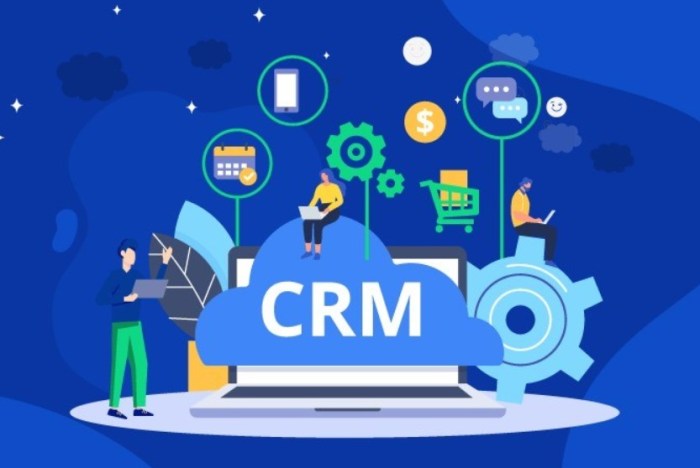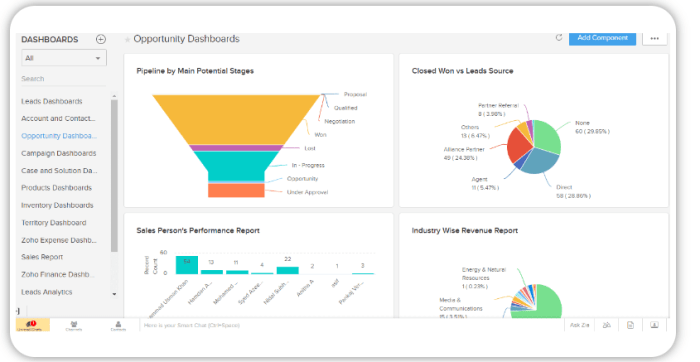In today’s competitive financial landscape, managing client relationships effectively is paramount for success. Financial advisors rely heavily on building trust and maintaining strong connections with their clients. This is where Customer Relationship Management (CRM) software steps in, offering a powerful solution to streamline operations, enhance client engagement, and ultimately drive growth. This comprehensive guide delves into the crucial role of CRM software for financial advisors, exploring its key features, benefits, and considerations for selection.
Understanding the Needs of Financial Advisors
Financial advisors face unique challenges requiring specialized CRM solutions. Their needs extend beyond basic contact management. They need tools to manage complex client portfolios, track interactions, comply with stringent regulatory requirements, and ultimately, nurture long-term client relationships for sustained growth. Key requirements include:

Source: surgahosting.com
- Secure Data Storage and Access: Protecting sensitive client data is crucial. A robust CRM must adhere to industry regulations like GDPR and CCPA.
- Client Portfolio Management: Tracking assets, investments, and financial goals for each client is essential for personalized advice.
- Communication and Collaboration Tools: Seamless communication channels (email, phone, video conferencing) facilitate efficient client interaction and internal team collaboration.
- Reporting and Analytics: Data-driven insights are vital for performance tracking, identifying trends, and making informed business decisions.
- Compliance and Audit Trails: Maintaining detailed records of all client interactions is crucial for regulatory compliance and auditing purposes.
- Integration with Other Financial Tools: Seamless integration with existing platforms like portfolio management software and accounting systems is highly desirable.
Key Features of CRM Software for Financial Advisors
Effective CRM software for financial advisors incorporates several key features designed to address their specific needs. These features go beyond basic contact management and delve into specialized functionalities:
Client Relationship Management
- 360° Client View: A centralized hub providing a complete overview of each client’s profile, including contact information, financial details, interaction history, and goals.
- Contact Management: Efficiently manage client contacts, track communication history, and schedule appointments.
- Client Segmentation: Group clients based on demographics, investment strategies, or other relevant criteria for targeted marketing and personalized service.
- Lead Management: Track potential clients from initial contact through the sales process, nurturing relationships and converting leads into paying clients.
Financial Planning and Portfolio Management, Crm software for financial advisors
- Portfolio Tracking: Monitor client portfolios, track asset performance, and generate reports on investment returns.
- Financial Goal Setting: Collaborate with clients to define financial goals and track progress towards achieving them.
- Performance Reporting: Generate customized reports showcasing portfolio performance, investment strategies, and client progress towards their financial objectives.
Compliance and Security
- Audit Trails: Maintain detailed records of all activities, ensuring compliance with regulatory requirements and providing a clear audit trail.
- Data Encryption and Security: Protect sensitive client data with robust security measures, including data encryption and access controls.
- Regulatory Compliance: Adhere to relevant industry regulations, such as GDPR, CCPA, and FINRA rules.
Workflow Automation and Productivity
- Task Management: Assign and track tasks related to client management, ensuring timely completion and preventing missed deadlines.
- Workflow Automation: Automate repetitive tasks such as email marketing, appointment scheduling, and report generation, freeing up time for higher-value activities.
- Document Management: Store and access client documents securely, ensuring easy retrieval when needed.
Choosing the Right CRM Software
Selecting the appropriate CRM software involves careful consideration of several factors:
- Scalability: Choose a solution that can adapt to your growing business needs.
- Integration Capabilities: Ensure seamless integration with existing financial tools and platforms.
- User-Friendliness: Opt for a CRM with an intuitive interface that is easy for your team to learn and use.
- Cost and Pricing: Consider the total cost of ownership, including licensing fees, implementation costs, and ongoing maintenance.
- Customer Support: Choose a vendor with responsive and reliable customer support.
Benefits of Using CRM Software for Financial Advisors
Implementing a robust CRM system offers numerous advantages for financial advisors:
- Improved Client Relationships: Personalized service and proactive communication strengthen client relationships and foster loyalty.
- Increased Efficiency and Productivity: Automation of tasks frees up time for higher-value activities, such as client interaction and strategic planning.
- Enhanced Compliance: Streamlined processes and detailed record-keeping ensure compliance with regulatory requirements.
- Data-Driven Decision Making: Access to real-time data and insightful reports enables informed business decisions.
- Improved Client Retention: Stronger client relationships and personalized service contribute to higher client retention rates.
- Increased Revenue and Growth: Improved efficiency, stronger client relationships, and data-driven strategies contribute to business growth.
Frequently Asked Questions (FAQ)
- Q: What is the cost of CRM software for financial advisors? A: The cost varies widely depending on the features, scalability, and vendor. Expect a range from affordable monthly subscriptions to more expensive enterprise solutions.
- Q: Is CRM software secure? A: Reputable CRM providers prioritize data security with measures like encryption and access controls. However, it’s crucial to choose a vendor with a strong security track record and compliance certifications.
- Q: How long does it take to implement CRM software? A: Implementation time varies depending on the complexity of the system and the size of your firm. It can range from a few weeks to several months.
- Q: Can CRM software integrate with my existing financial tools? A: Many CRM solutions offer integration capabilities with various financial platforms. Check the vendor’s specifications to ensure compatibility with your current systems.
- Q: What are the key metrics to track in a CRM for financial advisors? A: Key metrics include client acquisition cost, client retention rate, average revenue per client, and overall portfolio performance.
Conclusion
CRM software is no longer a luxury but a necessity for financial advisors seeking to thrive in today’s competitive market. By streamlining operations, enhancing client relationships, and providing data-driven insights, a well-chosen CRM can significantly contribute to increased efficiency, improved client satisfaction, and ultimately, sustainable business growth. Carefully consider your specific needs and choose a solution that aligns with your firm’s size, goals, and budget.
References
- Investopedia: CRM Definition
- Gartner: CRM
- (Add other relevant links here)
Call to Action: Crm Software For Financial Advisors
Ready to transform your financial advisory practice? Explore the leading CRM solutions available today and discover how you can elevate your client relationships and drive business success. Contact us for a free consultation to discuss your specific needs and find the perfect CRM fit for your firm.
Questions and Answers
What are the key features to look for in a CRM for financial advisors?
Key features include robust contact management, lead tracking and nurturing capabilities, secure document storage, reporting and analytics dashboards, integration with other financial software (like portfolio management systems), and compliance features.
How much does CRM software typically cost?

Source: irnpost.com
Pricing varies widely depending on the features, number of users, and vendor. Expect to find options ranging from affordable monthly subscriptions to more expensive enterprise-level solutions.
What is the best way to implement a new CRM system?
Successful implementation involves careful planning, thorough data migration, comprehensive staff training, and ongoing support. Consider engaging a consultant for assistance with complex implementations.
How can a CRM improve client retention?

Source: com.au
A CRM enables personalized communication, timely follow-ups, and proactive engagement, fostering stronger client relationships and increasing the likelihood of long-term retention.
